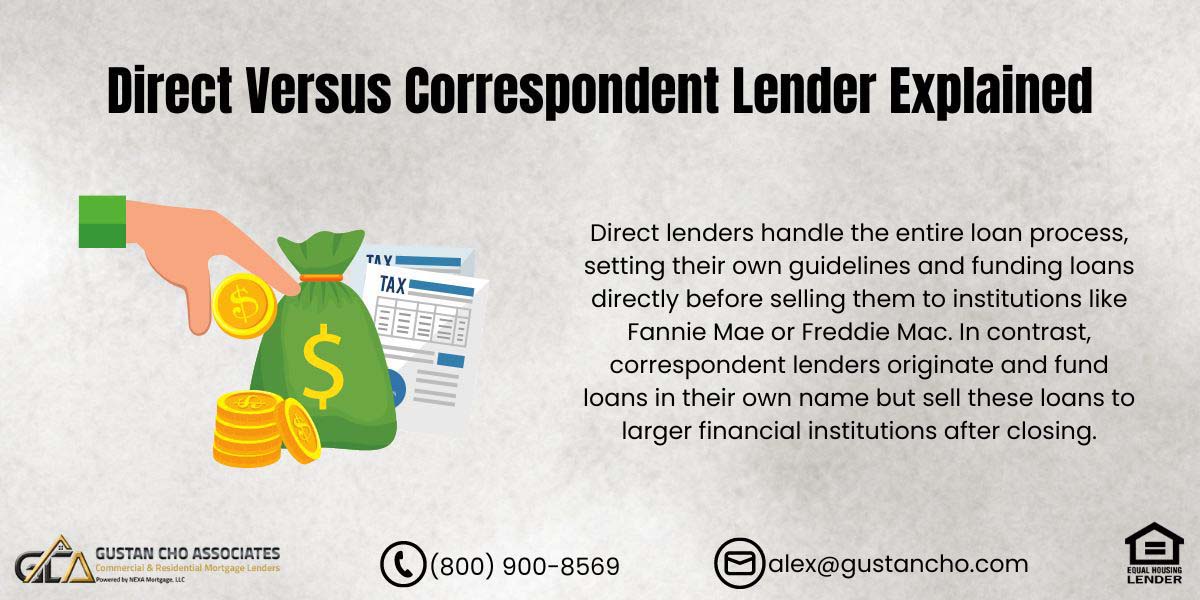In this article on the difference between a direct versus correspondent lender, we will explore the advantages and disadvantages of each choice when seeking a mortgage for a home. There are several different types of lenders, and depending on each borrower’s credit and income profile, choosing a specific lender may be more beneficial than going to another. The types of lenders borrowers can consider include mortgage brokers, correspondent lenders, and direct lenders. We will explore the specifics and outline the pros and cons of direct lenders versus correspondent lenders to assist you in making an educated choice.
What Are The Differences Between Mortgage Brokers?
When comparing direct lenders to correspondent lenders, it is crucial to grasp the function of mortgage brokers. Mortgage brokers must be licensed and act on behalf of multiple lenders, often maintaining relationships with either a single direct lender or numerous lenders.
Most direct lenders do not deal directly with the public; they use mortgage brokers as their sales force to avoid the costs and regulatory headaches associated with running a retail operation.
The advantage of working with mortgage brokers is that they act as intermediaries on behalf of borrowers, often in exchange for a commission, allowing borrowers to access the best mortgage interest rates through direct lenders. Brokers can also offer borrowers various loan options tailored to specific credit issues. However, direct lenders typically offer lower rates than mortgage brokers.
Correspondent lenders, who partner with direct lenders, originate and fund loans in their own name but sell them to larger financial institutions after closing. While mortgage brokers can provide a wide range of options, they need control over the underwriting and funding decisions, relying on direct and correspondent lenders for these processes. From experience working at various mortgage companies, dealing directly with direct and correspondent lenders is often more beneficial than working through brokers.
Confused About Direct vs. Correspondent Lenders? We’re Here to Help!
Whether you’re working with a direct or correspondent lender, we can guide you through the process and help you secure the best loan. Contact us today to learn more about your options.
What Are Direct Versus Correspondent Lender
Having personal experiences working with both correspondent and direct lenders, I have observed the pros and cons of each. When considering a direct versus correspondent lender, one significant advantage of direct lenders is that they have their own underwriters and maintain full control over the entire loan process. This level of control can lead to quicker decision-making and a more streamlined approval process.
On the other hand, while often offering personalized service and competitive rates, correspondent lenders usually operate by originating and funding loans in their own name before selling them to larger financial institutions. Although they might have more flexible underwriting guidelines, they typically have fewer loan products than direct lenders.
Benefits Of Direct Versus Correspondent Lender
The advantages of working with correspondent lenders versus direct lenders revolve around their unique relationships and processes. Correspondent lenders act as intermediaries, maintaining relationships with several direct lenders and originating loans under their names.
These loans are then sold to direct lenders, who take over the servicing of the loans once they are funded. Both direct and correspondent lenders fund mortgage loans under their own company names. Still, correspondent lenders sell the loans to direct lenders such as Chase or Citibank.
In the direct versus correspondent lender dynamic, the correspondent lender must adhere to the specific guidelines of the direct lender to whom they plan to sell the loan. For instance, if a loan originated by a correspondent lender is intended to be sold to Citibank or Chase but fails to meet their guidelines, the direct lender will reject the loan, requiring the correspondent lender to correct any issues.
The main advantage of correspondent lending is that a mortgage company can have multiple correspondent relationships with different direct lenders, which provides a wider range of options and greater flexibility in meeting the needs of borrowers.
Overlays By Mortgage Lenders
When considering the differences between a direct and correspondent lender, it’s essential to understand their respective flexibilities. Direct lenders can have overlays on many items, which means they set additional guidelines on top of standard loan requirements. This allows them to be selective about which files to submit based on the borrower’s specific needs.
For instance, if a borrower has a higher debt-to-income ratio, a correspondent lender can sell the loan to a direct lender that does not impose overlays on debt-to-income ratios. Similarly, if a borrower has a credit score of 580 FICO, the correspondent lender can choose to sell the loan to a direct lender that does not have overlays on credit scores. This flexibility in choosing where to place loans makes correspondent lenders valuable for borrowers with unique financial situations.
What Are Direct Lenders
Direct lenders, or mortgage companies, usually operate independently without relying on other lenders and establish their own lending criteria. Subsequently, they sell the loans they have funded to Fannie Mae, Freddie Mac, or Ginnie Mae. The advantages of dealing with direct versus correspondent lenders include that direct lenders process and underwrite loans according to their own guidelines.
However, because direct lenders assume greater risk than correspondent lenders, they often impose additional requirements known as overlays. This increased risk also means that the fees charged by direct lenders are usually substantially higher than those of other lenders.
What is the Difference Between a Broker and a Correspondent Lender?
When comparing a direct versus correspondent lender, it’s important to understand their distinct roles in the mortgage process. A lender that provides funds directly, like a bank or credit union, manages the complete loan procedure, from processing the application to disbursing the funds.
They have full control over the approval, underwriting, and funding processes. This direct control can often lead to quicker approvals and closings. Direct lenders typically offer a wide range of loan products, which can benefit borrowers looking for specific terms or rates.
On the other hand, a correspondent lender originates and funds loans in their own name but then sells these loans to larger financial institutions after closing. While they may offer competitive rates and personalized service due to their more flexible underwriting guidelines, they usually have fewer loan products than direct lenders. Borrowers working with correspondent lenders may experience faster processing times. Still, they should know that their loan servicing might be transferred to another institution after closing. This transfer can lead to dealing with different customer service teams and processes post-closing.
Not Sure About Direct vs. Correspondent Lenders? Let Us Help You Choose the Right Option!
Contact us today to discuss the differences between direct and correspondent lenders and find the best option for your needs.
Mortgage Brokers Need To Disclose Commissions
Direct lenders do not have to disclose their fees.
- For example, the maximum a mortgage broker can make is 2.75% on a commission which is called a yield spread premium
- Mortgage brokers can get a 5.75% yield spread premium on a borrower for a higher mortgage interest rate
- However, the maximum mortgage brokers can get as compensation is 2.75% and the difference between 5.75% and 2.75% or 3.0% needs to go to the borrower as a lender credit
- With direct lenders, they can just keep the extra 3.0% as part of their compensation without disclosing it
- Be careful when shopping for rates
This is because mortgage brokers will most often have higher rates than direct and correspondent lenders to commissions.
Negatives Of Direct Versus Correspondent Lender
Another disadvantage of dealing with direct versus correspondent lender is that direct lenders will only have one type of loan program, Mortgage brokers and correspondent lenders have multiple varieties of lenders where if you do not qualify with one particular wholesale lender, they can shop you to other lenders.
Gustan Cho Associates are direct and correspondent lenders. We also have the ability to broker loans. Dealing with Gustan Cho Associates borrowers have the luxury of dealing with a direct lender with no overlays and mortgage brokers to get any loan program borrowers may need.
FAQs: Direct Versus Correspondent Lender Explained
- 1. What is the main difference between direct and correspondent lenders? Direct lenders handle the entire loan process, setting their own guidelines and funding loans directly before selling them to institutions like Fannie Mae or Freddie Mac. In contrast, correspondent lenders originate and fund loans in their own name but sell these loans to larger financial institutions after closing.
- 2. What are the advantages of using a direct lender? Direct lenders can speed up approvals and closings by underwriting and processing loans according to their own criteria. They have complete control over the loan process and can provide a variety of loan choices designed to meet each borrower’s specific requirements.
- 3. How do correspondent lenders operate?Correspondent lenders initiate and finance loans under their names before selling them to bigger financial institutions. Their flexible underwriting guidelines often allow them to provide personalized service and competitive rates. Nevertheless, they generally have a smaller range of loan products compared to direct lenders.
- 4. What are the benefits of dealing with correspondent lenders? Correspondent lenders provide a wider range of options and greater flexibility by maintaining relationships with multiple direct lenders. They can choose the best direct lender for a borrower’s specific financial situation, which can benefit those with unique credit or income profiles.
- 5. How do mortgage brokers fit into the direct versus correspondent lender comparison? Mortgage brokers serve as middlemen connecting borrowers to various lenders, such as direct and correspondent lenders. Their role is to assist borrowers in securing favorable mortgage interest rates and a range of loan choices that address individual credit challenges. It’s important to note that brokers frequently offer higher rates because of their commission system.
- 6. What are the disadvantages of using a direct lender? Direct lenders often impose additional requirements, known as overlays, due to the greater risk they assume. This increased risk can also result in substantially higher fees than other lenders. Additionally, direct lenders typically offer fewer loan programs than brokers and correspondent lenders.
- 7. Why might someone choose a correspondent lender over a direct lender? A borrower might choose a correspondent lender over a direct lender for more personalized service and the ability to navigate flexible underwriting guidelines. Correspondent lenders can offer competitive rates and quicker processing times. However, borrowers should know that loan servicing might be transferred to another institution post-closing.
- 8. How do fees differ between mortgage brokers and direct lenders? Mortgage brokers must disclose their commissions, which are capped at a maximum compensation, often resulting in higher rates for borrowers. Direct lenders, however, do not have to disclose their fees and can keep additional compensation as part of their earnings without transparency.
If you have any questions about Direct Versus Correspondent Lender Explained or you need to qualify for loans with a lender with no overlays, please contact us at 800-900-8569. Text us for a faster response. Or email us at alex@gustancho.com. The team at Gustan Cho Associates is available 7 days a week, on evenings, weekends, and holidays.
This blog about Direct Versus Correspondent Lender Explained was updated on June 24th, 2024.
Direct Lender vs. Correspondent Lender: Let’s Find the Best Fit for You!
Reach out now to explore which lender type works best for your mortgage needs.









